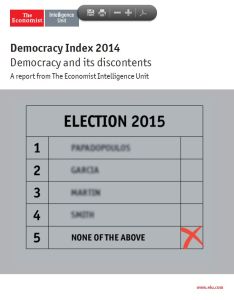Join getAbstract to access the summary!

Join getAbstract to access the summary!
The Economist Intelligence Unit
Democracy Index 2014
Democracy and Its Discontents
EIU, 2015
What's inside?
The Economist Intelligence Unit’s Democracy Index rates which nations are more – or less – democratic.
Recommendation
In its annual Democracy Index, the Economist Intelligence Unit provides an invaluable snapshot of how the world’s nations govern. It places 165 countries and two territories on a political spectrum divided into four groups: “authoritarian, hybrid regime, flawed democracy” and “full democracy.” The EIU’s uniquely rigorous approach clarifies the effects of the 2008 financial crash, the Arab Spring and Europe’s sovereign debt crisis on democracy everywhere. getAbstract recommends this study to anyone in global policy making, cross-border finance or international economics, and to those who follow international politics with interest – and, perhaps, dismay.
Summary
About the Author
The Economist Intelligence Unit is an independent research and analysis organization.


























































































































Comment on this summary